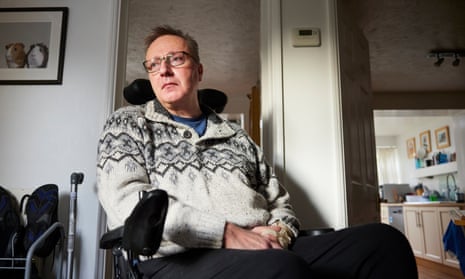A stroke survivor was threatened with court action after refusing to pay a £3,185 homecare bill as he alleged he received as little as 10 minutes care on visits supposed to last 45 minutes.
Adrian Robson, 55, from Knaresborough took a stand over the care arranged by North Yorkshire county council which he says left him uncleaned after using the toilet and has caused his wife to all but give up work to care for him.
The case comes amid growing concern about England’s strained homecare system where one-in-eight staff positions are vacant and 3.3m hours of home care went undelivered in the first half of 2022. Councils warn they are not receiving sufficient grants from Whitehall to fund the true cost of care, as prime minister Rishi Sunak wants more people to receive care at home to free-up congested hospitals.
Last week the Guardian reported on a West Sussex home care agency that appeared to spend under four minutes on care visits to a 78-year-old with dementia and filed records claiming far more care was given.
It has also emerged that the Care Quality Commission (CQC) was warned three years ago about the risk of fraud presented by homecare agencies cutting visits short – a practice known as “clipping”.
“Although we do not undertake specific monitoring of ‘clipping’, our inspections do look for evidence that care staff are meeting people’s needs,” said Kate Terroni, the CQC’s chief inspector of adult social care. “If we find that these needs are not being met – for whatever reason – we would take regulatory action.”
Meanwhile, a Hampshire man with a rare brain condition which renders him incontinent has been receiving eight-minute visits from carers who should be with him for 30 to 45 minutes, a friend told the Guardian.
“The initial excuse I was given is that they had done everything they needed to do.” the friend said, requesting anonymity. “I kept a detailed excel sheet of the time assigned and the time actually spent. Consistently, the visits were approximately 50% less than what [the council] was paying [for].”
Robson, a former business analyst who needs extensive care, said that on one occasion carers came in and left almost immediately without giving him personal care as he requested.
“There was an incident when I was on the commode … and they were supposed to have cleaned me up … but they didn’t do a very good job at all,” he said.
“I would sniff him [when I returned from work] and he was dirty still,” said his wife, Michelle Robson. “It got to the stage where Adrian was getting low and I was getting low, having to come home and wash him. It got farcical.”
One agency involved said care slots were sometimes shorter than planned and cited the impact of the pandemic, but it did not charge for care that wasn’t delivered.
The Robsons cancelled the carers and Michelle Robson gave up most of her work at a supermarket to look after her husband, leaving her claiming benefits and feeling like she isn’t “adding value” to society or herself.
“I love looking after Adrian but it would be nice to get carers back so I could do more hours,” she said. “The worry I have is are they going to flit in and flit out and I will be back in the [same] situation.”
North Yorkshire county council warned Robson unless he paid the bill he would face court action. Robson complained about his care to the local government and social care ombudsman which found the council “was at fault as it incorrectly charged” him. The council has now dropped the court threat.
“We have apologised to Mr Robson for the distress, frustration and uncertainty the matter has caused, and this case is now closed,” said Richard Webb, director of health and adult services.
